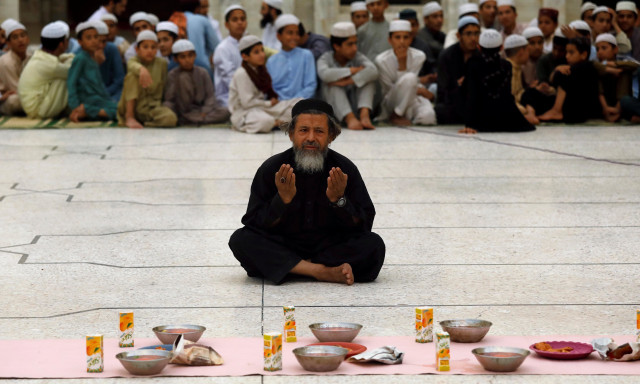For Karachiites, the gift is in giving
Throughout Ramazan, well-off residents make sure those in need partake in the holy month and prepare for Eid fully

A man prays before breaking his fast during the fasting month of Ramadan in Peshawar, Pakistan, May 6, 2019. PHOTO: REUTERS
Through all these ups and downs, there is one thing that the citizens of the city of lights have made sure remained consistent. Come what may, Karachi will always be the city with a heart of gold.
As the hub of the country's business community, Karachi has a long tradition of philanthropy. In times of crisis, natural or otherwise, there has been no instance when the city's well-to-do have not rushed to aid their fellow citizens and countrymen.
But perhaps this tradition is most intensely visible every year during Ramazan. From the first day of the holy month to its last, well-off Karachiites assist thousands of those in need either financially or through other means.
One common practice towards the end of Ramazan is the preparation of Eid gift hampers and ration bags, the intention being to ensure that the poorest too are able to enjoy Eidul Fitr to the fullest. In addition to cash and rations, the hampers often contain clothes, particularly traditional shalwaar kameez, and shoes, costing between Rs1,000 and Rs3,000. The gifts are distributed in addition to Zakat and Fitra payments.
Such hampers are distributed all over the city, in areas as diverse as Kharadar, Mithadar, Old City Area, Saddar, Ranchore Lines, Garden, PIB Colony Defense, Clifton, Gulshan-e-Iqbal, Nazimabad, North Karachi, Landhi, Korangi and Malir. Both men and women, young and old can be seen taking part in this practice equally.
"The rich in Karachi prepare ration bags and gifts in addition to giving Zakat, Fitra and other donations to charities, hospitals, madrassas and orphanages," said Haji Tasleem, who distributes gift items among the poor every Ramazan. "They either hand such bags and gifts to NGOs for distribution or distribute them themselves."
"Kharadar used to be the centre of distribution for aid items in Ramazan," said Imranul Haq, a volunteer for a local NGO. "Owing to poor conditions, however, the rich increasingly entrust NGOs with handing over these items to those in need."
According to Imran, a ration bag or gift can cost anywhere between Rs1,500 and Rs7,000. As many as 3,000 to 5,000 bags can be prepared under the patronage of a single donor, he said.
"The ration bags contain flour, sugar, rice, lentils, chickpeas, cooking oil, ghee, spices, tea, dates and juice bottles, among other items," the NGO worker said. "The bags are prepared by placing orders with department stores and wholesale markets before and during Ramazan."
NGOs and welfare groups also get in on this action on their own. More than 500,000 families received bags from the Al Mustafa Trust this Ramazan, according to a trustee of the organisation. Another 50,000 families received rations from the Alamgir Welfare Trust, Joint Secretary Shakil Dehlvi said. Saylani welfare distributed gift and ration bags amongh 40,000 families, according to trustee Arif Lakhani. The Al Khidmat Welfare Trust distributed gifts and rations among 10,000 families, the group's CEO Saleem Azhar said.



















COMMENTS
Comments are moderated and generally will be posted if they are on-topic and not abusive.
For more information, please see our Comments FAQ